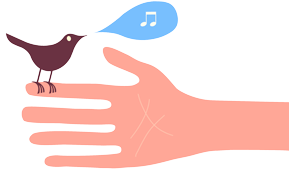 You are in line at a buffet and the person next to you says, “Oh my God, I’m going to regret this tomorrow!”
You are in line at a buffet and the person next to you says, “Oh my God, I’m going to regret this tomorrow!”
Or you are at dinner with friends and someone says, “I wish I could have that but I’m being good today!”
Or you are talking with a relative you haven’t seen in a while who says, “I’m doing keto right now and I’m feeling great!”
First of all, what the heck is going on here? Why are people bringing up food and dieting out of the blue, even if they do not know you? Some possibilities:
- They are using food and diet talk as a way to connect with you because they assume you will share their feelings. And, often, they are correct that this is a way to connect, especially (but not only) for women in our culture. We have been taught that the size of our bodies and the food we eat are among the most important things about us and are always an appropriate topic of conversation. The assumption that another woman will share your negative body image, issues around food, and dieting experience is usually a pretty good assumption. When that is not the case, people often are genuinely surprised. This conversational strategy works well for them a lot of the time.
- They feel anxious and out of control in the social situation so they say something to remind themselves of a way they (think they) have control. You may just be an innocent bystander observing their inner battle.
- They feel bad about themselves and want to be praised and reassured. They want you to agree with them so they feel less alone or they want you to compliment them on their admirable restraint and self-discipline or they want you to notice that they lost weight (which they think is an accomplishment).
- They are being passive-aggressive and trying to get you to pay attention to your own food choices or weight. Especially if you are fat yourself, this kind of weight, food and body talk is oppressive and it reinforces the negative body image we have been taught to have. Usually, people who make these kinds of comments are being negatively affected by their own internalized oppression which feels so unbearable they would rather just pass on the negativity to you. Even when this is what people are doing, it is important to remember that it is not about you. Even if the other person is trying to make you feel bad, it’s not about you. That’s their own stuff they are dealing with.
In general, try to remember that you are not obligated to respond in any particular way or to respond at all. You do not have to educate people. You do not have to be polite. You do not have to be harsh. You do not have to engage or disengage. You do not have to take it personally. You do not have to pretend that you are not hurt if you are. You do not have to keep having a relationship with this person and you do not have to terminate your relationship. You have choices about whether and how you respond. Allow yourself to experiment with different responses.
However. If you are an ally to fat people or to people with eating disorders and not one of those people yourself, please consider speaking up in some way. If you are an ally to people in an oppressed group, your speaking up can be very supportive to those being oppressed. If you have thin privilege, for instance, speak up against fat oppression when you can. Even though it may be uncomfortable for you, I assure you it is way less comfortable for the people who are being oppressed by diet and weight talk.
So how to respond? Here are my top ten suggestions:
- Humor: “Oh, don’t worry, I’ll eat enough for both of us!” Or my favorite: “While you are getting smaller, I’m twice the woman I used to be!”
- Political humor: (conspiratorially) “Hey, let’s be rebels and eat whatever we want today.”
- Refusal to engage: “Mmmhmm” or silence or walking away. (blandly ignoring this kind of talk)
- Genuine sympathy: “I hadn’t realized you were feeling bad about your body. I’m sorry to hear that.”
- Sharing: “I know this stuff is hard. I had to do a lot of work on myself before I started feeling OK about my body as it is.”
- Cheerful contradiction: “I hope you allow yourself to eat whatever you like and don’t have regrets about it!” or “You’re good no matter what you eat!” or “I love you no matter what you eat or don’t eat!”
- Assertiveness: “I think talking like that about food and weight is oppressive. Please don’t do that around me.”
- Puzzlement: “What do you mean?” or “Really? What makes you say that?” or “Why are you doing that?”
- Social justice: “Power to the people! Fat people unite!”
- Redirection: “Speaking of food, that muffin looks fabulous. Do you like to bake?” Or, more obviously: “So, what (else) have you been up to lately?”
And one more overall suggestion: go into social and family gatherings prepared. The chances that you will encounter diet and weight talk are high. You do not have to dread it, you can simply anticipate and plan for it. Think ahead of time about some topics of conversation you could bring up if you want to change the topic. Think about who might say problematic things and consider how you might respond. Contemplate how you will respond to strangers if they start talking about food or dieting or negative body image.
I know it is difficult. And I suspect you are more capable than you think you are.
